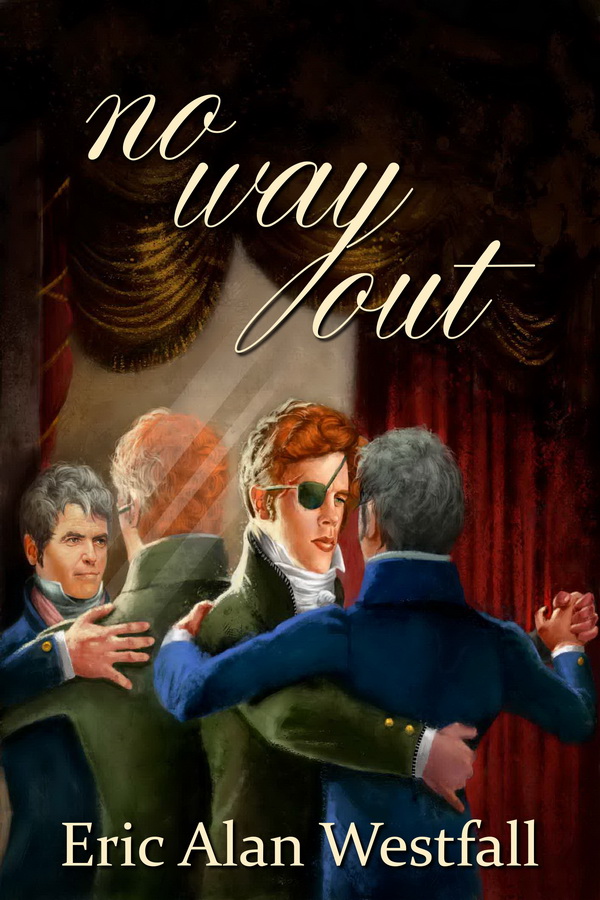Another England 3
by
It’s April of 1816 in Another England.
And Jeremy—a whore from the Dock—is living in a guest bedroom in the London home of the (in)famous Iron Marquess, with over fifteen days missing from his life.
For someone who remembers everything from his third birthday on, it’s unnerving not to know. Fine, fourteen days for the coma and the infection delirium, with a couple of brief remembered moments. But those first thirty-six hours. Do they explain how he got hurt, how he got to Ireton House, and why his lordship’s mountain-sized valet is taking care of him? Or why his ironness looks at him with nothing iron at all in his eyes?
Jeremy and the Iron Marquess both have dark secrets. Toss in a forced engagement, an inheritance, a scheme to clap Jeremy in Bedlam, a wall in a hall with paintings to the left and waiting emptiness to the right, the revelation of the missing hours, a problem with plumage, some numbered accounts, and a long sea voyage, and even with incredible sex, humor, Shakespeare, Lewis Carroll, and a fabulous toy collection, it all seems to mean there’s no way out of the snares surrounding them.
Or is the old saying true: where there’s a waltz, there’s a way?
152,612 words of story (roughly 508 pages in a mass market paperback)
All royalties will go to a local LGBT organization.
- 1 To Be Read list
- 1 Read list
Cover Artists:
Genres:
Pairings: M-M
Heat Level: 4
Romantic Content: 4
Ending: Click here to reveal
Character Identities: Gay
Protagonist 1 Age: 36-45
Protagonist 2 Age: 18-25
Word Count: 152612
Setting: England 1816, and elsewhere
Languages Available: English
Series Type: Same Universe / Various Characters
- IT ALL BEGINS
6 April 1816
1:38 p.m.
Ireton House, London
no way out
The voice was back.
Inside my head.
Still I swiveled, twisting to look behind, knowing I would see what I always see when the words are said—nothing. The unpainted, scuffed wooden floor was empty. The door to second story elegance had not creaked since we passed through, shutting it behind us, moments ago. The stairs to lesser third-story elegance and fourth story no elegance at all were both bare of bodies who might whisper words only I could hear.
READ MOREI turned forward again, teetered, and reaching out, slapped my palms flat against the walls of the narrow servants’ stairs. Pressing hard, I tilted back, but my socked foot slipped on the slick wooden edge. When I landed, the floor made known its displeasure with a sharp splinter through the rope-belted loose trousers, ill-fitting smalls, and into my bum. I yelped.
The cold voice of Thomas, the senior footman, rose up the stairwell from the landing below. “His lordship is waiting.”
I shifted my weight to my left hip, and rolled to my knees, giving him a fine view of my bottom if he was watching, which was by now instinctive. I made a point of lifting my left leg with great care, and with equal care placing my foot on the floor, again in case he was watching. A right foot repeat and then some clearly awkward struggling to get myself as upright on the landing as I could—although a boy with a twisted spine and a twisted leg can never be truly upright—followed by a shuffle-step away from the edge. I suppressed the temptation to rub my right arse cheek. Without turning around I called down, “Well, bugger ‘is bleedin’ lordship! Me feet ‘urt ‘n me arse ‘as been ‘urt, too.”
My feet didn’t hurt much any more. Though bandaged still, and covered with the thick wool stockings sagging around my ankles, they had almost healed. But the pretense might keep me here, with a comfortable bed, and good food, for just a while longer. I grinned a small, wicked grin to myself, and wiped it away as I turned to face the stairs. “Right, then. Shall I drop me britches, turn ‘n bend and you can see what’s stickin’ in me bum, ‘n maybe come up ‘n pull it out?”
It was amazing how much disdain could be contained in stare and stance. Thomas even managed to look down his nose while looking up the stairs.
“Orright, orright. Jus’ wait a bleedin’ minute. ‘n you might want to close yer eyes so’s y’don’t see somethin’ what might ‘orrify you, just in case me grip slips, ‘cause I ain’t goin’ nowhere with somethin’ stickin’ in me arse.”
My hands were on the knot in the rope, and I grinned broadly when the footman closed his eyes, with a stern “Be quick about it then, boy.”
I untied the knot, loosening the waistband since whoever supplied the trousers was much thicker around the middle than me, using my left hand to hold the pants up. I reached behind, and working my right hand into my smalls and found the painful little bugger. With thumb and forefinger I wiggled it free, brought my hand round to the front, and looked at the bloody, bloody thing. I shouldn’t have, but I did. I lifted the three-quarter-inch sliver before my face. “Oi! Is this a dagger wot I see before me?”
Bloody hell. Bloody, bloody, bloody hell. Maybe Thomas wouldn’t.... Well, bloody hell all over again, he did. The footman was looking at me now, his eyes wide, his mouth open to say something, and then he slowly shut it.
It would only make it worse if I tried to cobble together an explanation of why, or how a sixteen-year-old street boy (the age I gave) could paraphrase The Scottish Play. I shut my own mouth, dropped the splinter, retied the knot, and began descending the stairs with care, one thumping step at a time. I braced one hand against the wall—his lordship did not believe in hand rails for his servants—in case of another slip. The footman waited until I was almost at the landing before turning away. Watching my downward struggle, he was unconcerned about the possibility of another fall, his expression informing me if I fell I was on my own. I followed in silence as we went through the halls of the first floor to the front of the house.
Ah, his lordship’s library. I stared at the door.
I’d been in there, just the once, when I shouldn’t have been. But then, I shouldn’t have been in the house in the first place, but I was, though I didn’t know why. Or how I came to be here. Both were part of what was missing. I could remember every...bloody...thing in my life up to the night before...whatever...happened. Remember the Dock on the 11th, the clock in my head saying it was ten thirty at night when I finished the last man. I remember the glint of the shilling as it spun through the air, making me get off my knees, bend and stretch to reach it in the muck. The feel of the metal between my fingertips as I picked it up. Then the twist and roll away, my back taking the brunt of the kick meant for my belly. The man was one of those who, once done, and eager to be tucked and buttoned away, feels guilty and lashes out at the one responsible for his sin. I remember his silhouette as I got to my feet, his realizing how much taller I was, and how the silhouette turned and hurried away.
Then nothing more until I woke up too damned many days later in a bloody nobleman’s house, in sobbing agony, weak, my feet, head and thigh throbbing with pain.
COLLAPSE





